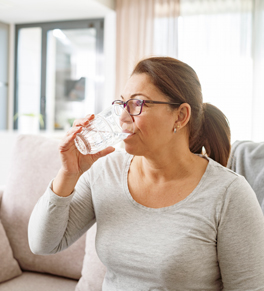
Tips for a successful colonoscopy preparation

Colonoscopy is the gold standard for detecting and preventing colorectal cancer, which is the second-leading cause of cancer deaths in men and women combined. It’s almost completely preventable with regular colonoscopies, yet many people try to avoid them.
The challenging and unpleasant part of the procedure isn’t the colonoscopy, itself. It’s the preparation to empty the bowel completely: foregoing solid food for a day and, most commonly, drinking four liters of a liquid preparation to induce diarrhea the day before the screening exam.
“Good colonoscopy preparation is crucial for maximizing adenoma detection rates,” says Dr. William Karnes, a gastroenterologist at the UCI Health Chao Digestive Health Institute.
Adenomas are precancerous polyps that, if not removed, can become malignant tumors in the colon or rectum. The purpose of a colonoscopy is to find and remove them before they do so.
Following instructions critical
In a colonoscopy, a doctor uses a flexible fiber-optic tube, or endoscope, to examine the large intestine, anus and rectum for adenomas or other irregularities.
If the preparation is well-executed, the colon is fully cleansed and ready for examination. If not, the procedure may be canceled and you would be asked to reschedule.
The colon needs to be completely empty to detect adenomas, Karnes says. That means following all instructions during the process, including avoiding:
- Alcohol and milk
- High-fiber, pulpy foods
- Red or purple foods
- Seeds and other indigestible substances
Common preparation mistakes
Among the most common reasons Karnes cites for rescheduling colonoscopies are:
- Not following preparation instructions. “Many patients do not adhere strictly to the preparation regimen, which is crucial for effective bowel cleansing,” Karnes says. To improve compliance, he follows the guidelines set by the American Society for Gastrointestinal Endoscopy (ASGE), which recommends providing both verbal counseling and written instructions in the patient's native language.
- Incorrect preparation timing. Taking the liquid preparation medication at the wrong time can result in suboptimal cleansing. Taking the last dose four to five hours before the procedure is important, Karnes notes.
- Inadequate hydration. “Dehydration can lead to poor preparation,” he says. That can also increase the risk of electrolyte deficiencies, dizziness, headache and confusion.
- Consuming the wrong foods and liquids. “On the day before the procedure patients may have a low-residue breakfast such as eggs, plain yogurt and meat," Karnes advises. "Follow a clear liquid diet beginning at noon and avoid any red or purple liquid," noting that these fluids can obscure the doctor’s ability to see polyps.
- Taking constipating medications. Be sure to tell your doctor about all of the prescriptions and supplements you are currently taking that may hinder a thorough bowel cleansing.
We’re all human and mistakes happen, Karnes acknowledges. But if you’re not sure how to proceed, he recommends calling your physician.
“When patients call with a concern, the on-call gastroenterologist can discuss the situation and advise on potential pre-procedure salvage strategies, such as additional preparation, delaying the procedure time or rescheduling.”




